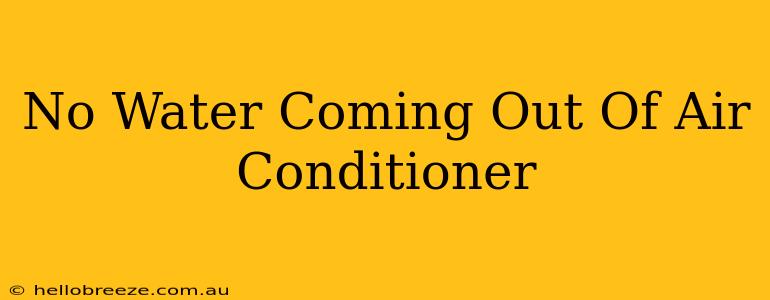Is your air conditioner running, but no water is draining? This common problem can stem from several issues, and diagnosing the root cause is key to getting your AC back to peak performance. This guide will walk you through the most common reasons why your air conditioner isn't producing condensation, offering troubleshooting tips and solutions to get your system working again.
Why is My Air Conditioner Not Draining Water?
A properly functioning air conditioner removes moisture from the air, producing condensation that needs to drain properly. If this drainage system malfunctions, water can back up, leading to leaks and potential damage. Here are the primary culprits:
1. Clogged Drain Line: The Most Common Culprit
The most frequent cause of no water draining from your air conditioner is a clogged drain line. Dust, dirt, algae, and even mold can build up over time, restricting or completely blocking the flow of water.
- Troubleshooting: Locate your drain line (usually a PVC pipe) and check for visible blockages. You may need a flashlight and possibly a small tool to investigate.
- Solution: Carefully flush the drain line with a mixture of water and a drain cleaner designed for this purpose. A wet/dry vacuum can also be helpful in removing debris. For persistent clogs, you may need professional assistance.
2. Frozen Evaporator Coil: A Serious Problem
A frozen evaporator coil prevents proper drainage. This usually happens due to:
-
Restricted Airflow: Dirty air filters, clogged vents, or obstructions around the unit restrict airflow, causing the coil to freeze.
-
Low Refrigerant: Insufficient refrigerant reduces the coil's cooling capacity, leading to ice formation.
-
Faulty Blower Motor: A malfunctioning blower motor can't circulate enough air, resulting in freezing.
-
Troubleshooting: Check your air filter and ensure vents are clear. If you suspect low refrigerant or a blower motor problem, call a qualified HVAC technician. Attempting repairs yourself on these components can be dangerous.
3. Damaged Drain Pan: Leaks and Overflow
A cracked or damaged drain pan can prevent proper water collection and drainage. Even small cracks can lead to significant leaks.
- Troubleshooting: Carefully inspect the drain pan for cracks, holes, or other damage. This may require removing the access panel to your unit.
- Solution: A minor crack might be repairable with a sealant designed for use with metal. However, extensive damage usually necessitates replacing the drain pan entirely. This is best done by a professional.
4. Condensate Pump Malfunction: For Specific Systems
Some air conditioners use a condensate pump to move water to a drain line. If the pump fails, water won't drain.
- Troubleshooting: Check the pump for any signs of malfunction. You may need to consult your air conditioner's manual or seek professional assistance.
- Solution: If the pump is malfunctioning, it likely needs repair or replacement. A professional HVAC technician is best equipped to handle this.
5. Improper Installation or Sloping: A Rare But Possible Issue
In rare cases, improper installation of the drain line or a lack of proper slope can prevent water from draining effectively. This is usually an issue discovered at the time of installation.
- Troubleshooting: Observe the drain line to ensure it's correctly sloped towards the drain.
- Solution: If the drain line is improperly installed, a professional HVAC technician is needed to correct the problem.
Preventing Future Problems
Regular maintenance is crucial to prevent no-water issues with your air conditioner.
- Clean or Replace Air Filters Regularly: This is the single most important step in preventing many AC problems. Change filters every month during peak use.
- Schedule Annual Inspections: Professional inspections identify potential issues before they escalate into major problems.
- Flush the Drain Line Periodically: This helps prevent clogs and keeps water flowing smoothly.
Ignoring a non-draining air conditioner can lead to more serious problems like water damage and mold growth. Addressing the issue promptly is vital for your home's comfort and the longevity of your AC unit. If you are uncertain about any aspect of troubleshooting or repair, it's always best to contact a qualified HVAC professional.

